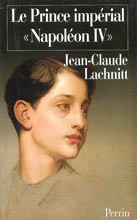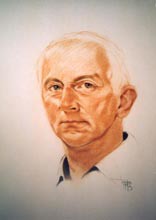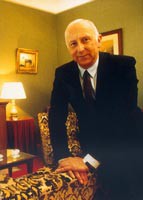From the theatre to history
David Chanteranne: What path did you take to follow in the footsteps of the famous historians of the Second Empire?
Jean-Claude Lachnitt: After a career in company management I became general secretary of the Jockey Club until retiring in 1989. But I have always been interested in history, especially during the summer of the Liberation of Paris. I was fifteen. As for books, all I had at the time was my local Paris library. I developed a keen interest in the theatre, especially the plays of Labiche, and in history, through Octave Aubry and his work on the two Empires: the Roi de Rome (Napoleon II), Napoleon III and Eugenie. I soon realised that historians in general did not view this period very favourably (to say the least). The Mallet-Isaac secondary-school history textbooks were partly to blame for this. After reading other biographies (notably one by the English writer Robert Sencourt), I became convinced that the Emperor and Empress had been much maligned by the official historiography of the Third Republic, a regime which itself was highly controversial in its early days (the electoral victory was by only one vote). To gain a foothold, the Republic perceived it necessary to discredit both the regime and the monarchs, despite the fact that they had achieved great successes over the eighteen years of their reign. You only have to think of the railway network and the transformation of the major cities, among them, of course, Haussmann’s Paris.
D.C.: What turned this sense of injustice into a passion?
J.-C. L.: I was drawn to the personalities of the Emperor and Empress and through my research, and after reading memoirs and recollections of the period, and a great deal of correspondence, my interest spread to include the First Empire, without which, of course, the Second Empire would never have existed. I then read a great deal and went to see a great many plays, notably L’Aiglon, by Edmond Rostand, at the Châtelet Theatre. Then things took their natural course. My character and my passionate nature drew me to the theatre, and I studied with Béatrice Dussane and Maurice Escande who encouraged me to take the entrance exam for the Conservatoire. This gave me experience in public speaking.
D.C.: Does your talent as a lecturer come from this combination of interests, your passion for history and for the theatre?
J.-C. L.: You might say that, but I also collected a few souvenirs related to the Prince Impérial. First of all, five letters addressed to Ernest Pinard, former Ministre de l’Intérieur to Napoleon III and before that the imperial prosecutor who became rather unfortunately famous for his addresses in the proceedings against Gustave Flaubert’s Madame Bovary and Charles Baudelaire’s Les Fleurs du mal, and these letters prompted me to take a closer interest in the life of the young prince. I then read the memoirs of Augustin Filon and began to collect books, manuscripts, photographs, medals and engravings concerning the Prince.
D.C.: Do you view this collection as a source of study?
J.-C. L.: Manuscripts and correspondence help you get to know a historical figure better, give you an insight into his personality. In the case of the Prince Impérial, certain texts written with a future government in mind radically transform the view unfortunately left for posterity by malicious historians. They lay to rest the much-peddled legend of a young man with no personality and no political opinions.
D.C.: Most of the studies you have carried out on major figures of the Second Empire also show the importance you attach to everyday objects, in a similar way to the writers of the Naturalist school at the turn of the century.
J.-C. L.: This is something I feel strongly about. How can you understand the death of the Prince without taking an interest for example in his choice of kit as a soldier and knowing that this proved fatal to him? Not to do so would be to leave out something that played a significant part in the events.
Before taking up the pen
D.C.: What event inclined you towards a career as an author, writer and historian?
J.-C. L.: In the sixties, a friend, aware of my love of the theatre, introduced me to the Baronne de la Baume who directed the Revue de Paris. I was then asked to write reviews of books on the theatre for the Revue until it ceased publication. I was a member of the Syndicat des Journalistes de la Presse Périodique. Then I gave my first lecture on the Prince Impérial to the Napoleonic association, the Association des Amis de Napoléon III. A member of the audience then mentioned me to the president of the Académie du Second Empire, Baron de Beauverger, who asked me, in 1979, to give another lecture on the tragic circumstances of the death of the Prince Impérial on the centenary of the event, a lecture which was subsequently published in the columns of the Revue du Souvenir Napoléonien. As a member of the board of governors of the Amis de Napoléon III, I had the great privilege of accompanying the Prince and Princess Napoleon on their trip to the scene of the tragedy in South Africa. We were received at the French Embassy in Pretoria and this trip finally convinced me, with the encouragement of several friends, to write a biography of the young prince who had been killed by Zulus a hundred years earlier. Thanks to Baron de Beauverger, a descendant of Comte Clary, I had access to unpublished documents and I gradually realised that these gave me greater insight into his character, and I was able to examine the details of his life, his passions and the friendships he developed in England.
D.C.: Tell me one of the most interesting discoveries you were fortunate enough to make?
J.-C. L.: An unpublished letter sent by the Prince to the Duke of Cambridge, which I quote in my book and in which he requests permission to pursue his military training in the British army (his branch was artillery), at Aldershot. As my manuscript was already at the typesetting phase with my publisher, it was necessary to cut a passage from the corresponding page to insert the contents of this letter. Over nearly twenty years I had gathered a great many unpublished documents necessary for this publication, and yet surprises can still happen at just the right moment and when you least expect it.
The Prince Impérial’s life
 D.C.: Through your book, you have placed great emphasis on the stages of the Prince’s “initiation”. Is this an important aspect of his life?
D.C.: Through your book, you have placed great emphasis on the stages of the Prince’s “initiation”. Is this an important aspect of his life?
J.-C. L.: Of all the Bonapartes, the Prince Impérial was the only child brought up to occupy the throne. The Roi de Rome had left France at the age of three and was thus too young to have the same experience. The son of Napoleon III was born crown prince and was raised as such until the age of fourteen. The other peculiarity about him is that he was the only member of the Imperial family to die in combat.
D.C.: Does the proper explanation of this tragedy lie with his courage and character?
J.-C. L.: It is clear that, from an early age, nothing frightened him. He was oblivious to danger. His attempt to climb the façade of the Tuileries is eloquent proof of his daring. His friend Espinasse also wrote of this rashness in his Mémoires. The weakness of Napoleon III towards his son also explains the strictness (as a reaction against that weakness) of the Empress… and not, as the malicious would have it, the coldness and authoritarianism of a mother who did not love her son.
D.C.: Was the presence at his side of Louis Conneau, the son of Napoleon III’s doctor, a steadying influence on him?
J.-C. L.: It is true that this near twin had a great influence on his character. When the young prince had become a little older and wiser, he shared his playmate’s passion for the military. His education, entrusted without great success to the young student and Rousseauist Francis Monnier, was taken over by Augustin Filon, a private tutor, who helped the Prince make up the lost ground. Like his grandmother Queen Hortense, he also had a great liking for the arts: he sang in tune, had a talent for drawing (especially caricatures), and following the example of his parents was a very good horseman.
D.C.: What is your opinion of the Prince Impérial’s decision to go to join the army, firstly at the Châlons camp and then at war?
J.-C. L.: If the Empress agreed to her son’s leaving (he was only 14 in 1870), it was in response to the wishes of this young Bonaparte, who wanted above all to be a soldier. She also felt that he would be safer in an army environment, where he was well-known and well-liked, than in Paris, forever hostile to reigning families. Her views were reinforced by the plebiscite, and the republicanism of the capital was common knowledge. The Empress’s acceptance of the war was the result of necessity not out of any liking for it.
D.C.: Considering the circumstances of the exile and then death of his father, can this be seen as another reason for Louis’ enlistment in the British army?
J.-C. L.: When he saw his father for the last time two days previously, his return on 9 January 1873, must have been the most moving and difficult time of his life. His fate was sealed. This was the great drama of his life, much more so than the defeat of 1870. And his desire to be an officer was, as you rightly say, only to become stronger.
D.C.: Once he had left for South Africa, you remind us the Empress only learnt of his death three weeks after the event. This distance in space and time must have made a mother’s pain even worse?
J.-C. L.: Indeed, when the Duc de Bassano came to tell her of the death of her son on 21 June, she wanted to believe at first that it was just a wound: “He is wounded, I am leaving immediately”. But when the Duke convinced her that it was too late, the Empress fainted, like a mother in a classical tragedy.
D.C.: You also describe the last moments of the Prince as those of a classical warrior, like a Homeric ode with Achilles as the central figure. Does this comparison help us to imagine the battle?
J.-C. L.: The death of this twenty-three year old youth, abandoned by his escort whose only task was to protect him, and who died on a reconnaissance mission, is a hero’s death. This is, in fact, how the fifty or so Zulus armed with assegais described it: his courage was recognised by his adversaries and they felt admiration for it. They compared him to a lion, an animal universally seen as valiant.
D.C. : Why did he set off with his father’s equipment?
J.-C. L.: Although spiteful legend has it that the Empress had refused to buy him new saddlery, the truth is that it was the Prince himself who insisted on taking with him this kit which his father had used in the war against Prussia. He wanted the saddle that had seen the defeat of Sedan to be marked with the seal of victory against the Zulus. His friend Espinasse had nevertheless pointed out to him the bad state of repair of the stitching on the surcingle (which was at risk of coming apart). But the Prince insisted on using it one more time for his first campaign. To claim that the Empress had refused to buy him anything new is as odious as it is false, given that she had opened an “unlimited” credit for him two years earlier with her banker Baring. And he had been in possession of the legacy of Princess Bacciochi since his coming of age.
D.C.: Why was it that the watch he was carrying at the time of his death did not reappear until much later?
J.-C. L.: At his baptism, he had been given a chain and a medal which he always carried. Napoleon III had left him just one item in his will, a small seal bought for him by Queen Hortense after the Egyptian campaign (and not brought back by Bonaparte). This was a souvenir both of his father and of his grandmother and he carried it with his medal. The Zulus did not dare touch them and they were found on his body on the day after his death. The watch he had in his pocket was stolen by a young Zulu who, intrigued by the noise, thought it was the cage of an unknown small animal. A short while later, not having been able to open it and believing the animal to be dead, he did not dare admit to his theft. It was only forty years later, just before he died, that he confided in a Protestant pastor who, as the Empress was dead, gave it to the Durban History Museum where it remains to this day.
D.C.: The prayer and will form a very fine historical pair. What were your reasons for including these in as an appendix to your book?
J.-C. L.: Not only for the nobleness of spirit of the prayer and the great generosity that emerges from the will, but also because these two texts lay to rest another legend, that of the Prince’s inconsistency and lack of interest in emotional, dynastic and political matters. And there is no better way to epitomise a life given over to commitment on behalf of others and to a cause that was close to his heart.
Historian of the Imperial family
D.C.: In the Dictionnaire du Second Empire, you give very full details on the Bonapartes: Jérôme, Prince Napoleon and his wife, Prince Victor and Prince Louis with the Duchesse d’Aoste. Where does this interest come from?
J.-C. L.: Through my historical research, and thanks to a fairly complete library on the matter, I have been able to give portraits that are brief but as exhaustive as possible. I observed that Napoleon I, who had distributed crowns to his brothers and sisters, had never given personal titles to the members of his family. He made many Dukes and Princes, but he never conferred a title on any member of the Bonaparte family. And Napoleon III, after him, only wished to give the title of Duc de Sartène to the first son of Jérôme and Elisabeth Patterson, and this was refused. This observation led me to write an article in the Revue du Souvenir Napoléonien on the attributes and titles of the Bonaparte family.
D.C. : Does your fascination with the Imperial family also stem from your meeting in 1979 with Prince Napoleon (deceased)?
J.-C. L.: The trip to South Africa undeniably changed my life and the kindliness shown me by the Prince and Princess reinforced my interest in the history of their family and Jérôme’s descendants. The dynasts of the Imperial family are in any case of great interest to the historian and allow us to look at the events of the century which is coming to an end in an entirely different way.
D.C.: What archive documents did you have access to?
J.-C. L.: Since 1979, the Prince and Princess Napoleon have allowed researchers to have access to an extremely interesting collection, now referenced under classification mark 400 AP in the Archives Nationales. This is an incredibly rich collection, now available on microfilm, and I have been able to benefit from it during my various research projects. These Napoleon archives are now open to everyone.



